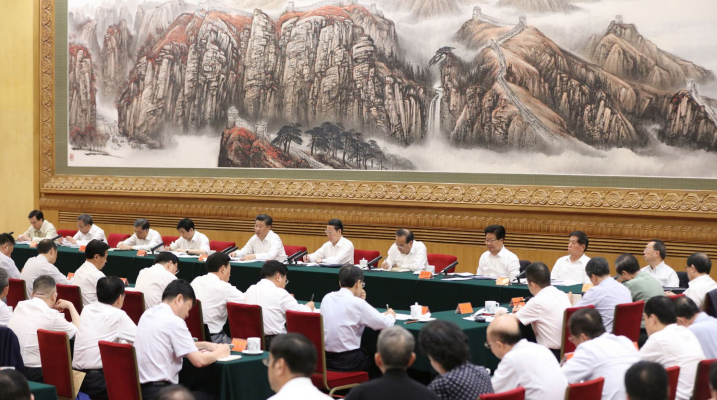'Belt and Road' initiative makes a difference far beyond borders
 0 Comment(s)
0 Comment(s) Print
Print E-mail China.org.cn, August 30, 2016
E-mail China.org.cn, August 30, 2016
General Secretary Xi Jinping of the Central Committee of the Communist Party of China (CPC), also Chinese president, called for a steady advance of the "Belt and Road" initiative to benefit people along the routes at a symposium held in Beijing on Aug. 17.
|
|
|
Chinese President Xi Jinping delivers a speech during a symposium on the "Belt and Road" initiative in Beijing, Aug. 17, 2016. |
Making up 63 percent of the world population, countries along the Belt and Road routes only account for 29 percent of the global economic aggregate, and the "Belt and Road" initiative is one of the best solutions to address the gap.
Bearing fruit
The progress and results of the "Belt and Road" initiative have been greater than expected, Xi said in his speech.
More than 100 countries and international organizations have participated in the initiative. China has signed agreements with more than 30 countries along the routes to jointly build the Belt and Road, and more than 20 countries have teamed up with China in capacity cooperation, said the president.
The total value of bilateral and multilateral capacity cooperation has exceeded US$100 billion under the framework, data released by the National Development and Reform Commission (NDRC) showed.
So far, China's Ministry of Education has inked deals with over 60 countries along the routes and Chinese companies have built 46 cooperation zones in these countries. In 2015, nearly half of the international students in China came from countries along the routes.
Meanwhile, more railways, highways and ports are being built along the routes. Freight trains have made more than 2,000 trips from China to Europe and back on 39 rail lines, according to the Ministry of Foreign Affairs.
Xi has paid state visits to a number of countries, including the Czech Republic, Serbia, Poland and Uzbekistan, along the Belt and Road this year. These diplomatic exchanges have significantly boosted cooperation within the framework of the initiative.
Launched in late 2013, the Belt and Road is an umbrella term for the Silk Road Economic Belt and the 21st-Century Maritime Silk Road. It will be a trade and infrastructure network connecting Asia with Europe and Africa along ancient trade routes.
Steering forward
As the second-largest economy in the world, China should be more proactive in dealing with global affairs and is willing to give other countries a ride, Xi said.
The Belt and Road is an opportunity to promote transnational interconnection, improve trade and investment cooperation, advance cooperation in international capacity and equipment manufacturing to rebalance and stabilize the world economy, noted Xi.
He stressed that priority areas for the initiative include building a platform to advance cooperation as well as a green, healthy, intelligent and peaceful Silk Road.
The president emphasized that more specific policies should be worked out, vowing that major support would be focused on strategic projects, including facilities cooperation, energy resource use and core technology research and development.
Calling for financial innovation and cooperation, Xi suggested establishing a stable, sustainable and risk-controllable financial security system to better serve the building of the Belt and Road.
He also urged a faster implementation of pilot projects in order to generate benefits as early as possible and ensure that the countries involved have "a sense of gain."
During his speech, Xi encouraged domestic enterprises to invest in countries along the Belt and Road routes and said countries along the routes are welcome to invest in China.
He also pointed out that the "Belt and Road" initiative should be integrated with the country's regional development plans such as the Beijing-Tianjin-Hebei coordinated development plan and the Yangtze River economic zone development plan. Cultural exchanges should not lag behind, he added.
Winning support
The world economy remains sluggish even eight years after the outbreak of the global economic and financial crisis, but China's "Belt and Road" initiative is conducive to efforts to revive it, said Hong Pingfan, director of the Development Policy and Analysis Division in the UN Department of Economic and Social Affairs.
China could share its development experience with other countries as well as find new markets for its production capacity through the Belt and Road projects, analyzed Wang Yiwei, an expert from Renmin University of China.
"In my view, this initiative is the most important strategic proposal on the planet," said Helga Zepp-LaRouche, founder and president of the Schiller Institute, an international think tank. She noted that the "Belt and Road" initiative is based on win-win cooperation and has a potential to help the world get rid of its current crises.
"If it succeeds, the initiative will create new wealth growth opportunities on the vast Eurasian continent and its seas," said Gu Xuewu, director of Center for Global Studies at the University of Bonn.
|
Infographic: Spirit of the Silk Road |








Go to Forum >>0 Comment(s)